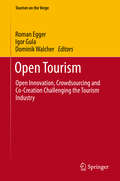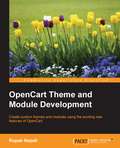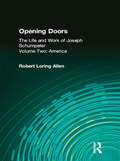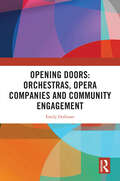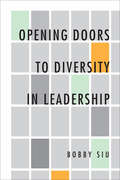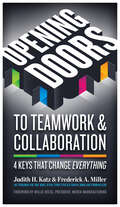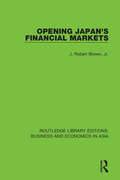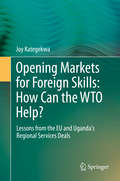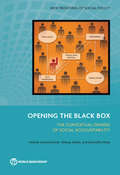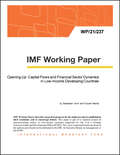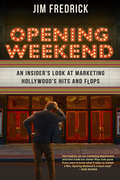- Table View
- List View
Open Tourism
by Roman Egger Igor Gula Dominik WalcherThis book examines the concepts of open innovation, crowdsourcing and co-creation from a holistic point of view and analyzes them considering their suitability to the tourism industry. Methods, theories and models are discussed and examined regarding their practical applicability in tourism. The book illustrates the theoretical mechanisms and principles of Open Innovation, Crowdsourcing and Co-creation with case studies and best practices examples. In addition to the scientific target group, the book is a useful resource for managers of the entire tourism industry. First, the book presents the theoretical fundamentals and concepts in 11 specific chapters. This basis is then enriched by three parts with case studies, focusing on information, creation and provision respectively. Finally in a concluding part the editors sum up the book and give an outlook on the implications, learnings and future perspectives of open innovation, crowdsourcing and collaborative consumption in the tourism industry.
Open Up: The Power of Talking About Money
by Alex HolderEver struggled to say 'no' to an expensive dinner with friends? Found yourself unable to ask for a payrise even though you deserved it? Got stuck in an overdraft and felt too ashamed to tell anyone?From friendships, to ambitions, to mental health, money plays a huge role in our lives and relationships, yet we're often too polite or embarrassed to talk about it. But in an age of pay-gap exposés and growing inequality, conversations about money are more important than ever.The Money Book is an outspoken, warm and timely book that destigmatises the way we talk, think and feel about money. It's full of conversations about money in everyday life - how we earn it, how we spend it and how it affects us. Whether learning from friends, being transparent with partners, finding community with colleagues or recognising what you're worth, talking about money means letting go of shame, and creating a healthy relationship with your finances. Full of sympathetic, practical advice on everything from mindfulspending to the freelance jump and how to challenge the status quo, this is a book that strips away the awkwardness, to help you find the power and solidarity of talking about money.
Open Veins of Latin America: Five Centuries of the Pillage of a Continent
by Eduardo Galeano"Open Veins of Latin America: Five Centuries of the Pillage of a Continent" is an informative, insightful, colorful, yet biased view of the failures of Latin America explained through the lens of a leftist ideology.
OpenCart Theme and Module Development
by Rupak NepaliThis book is aimed at developers and designers who want to start developing their own themes and extensions and for those who want to know about the code workflow of the OpenCart theme and modules.
OpenIDEO
by Karim R. Lakhani Anne-Laure Fayard Natalia Levina Stephanie Healy PokrywaThe case describes OpenIDEO, an online offshoot of IDEO, one of the world's leading product design firms. OpenIDEO leverages IDEO's innovative design process and an online community to create solutions for social issues. Emphasis is placed on comparing the IDEO and OpenlDEO processes using real-world project examples. For IDEO this includes the redesign of Air New Zealand's long haul flights. For OpenIDEO this includes increasing bone marrow donor registrations and improving personal sanitation in Ghana. In addition, the importance of fostering a collaborative online environment is explored.
OpenIDEO (B)
by Karim R. Lakhani Anne-Laure Fayard Jin Hyun Paik Manos GkeredakisIn the midst of 2020, as the coronavirus pandemic was unfolding, OpenIDEO - an online open innovation platform focused on design-driven solutions to social issues - rapidly launched a new challenge to improve access to health information, empower communities to stay safe during the COVID-19 crisis, and inspire global leaders to communicate effectively. OpenIDEO was particularly suited to challenges which required cross-system or sector-wide collaboration due to its focus on social impact and ecosystem design, but its leadership pondered how they could continue to improve virtual collaboration and to share their insights from nearly a decade of running online challenges. Conceived as an exercise of disruptive digital innovation, OpenIDEO successfully created a strong open innovation community, but how could they sustain - or even improve - their support to community members and increase the social impact of their online challenges in the coming years?
Opening America's Market
by Alfred E. EckesDespite the passage of NAFTA and other recent free trade victories in the United States, former U.S. trade official Alfred Eckes warns that these developments have a dark side. Opening America's Market offers a bold critique of U.S. trade policies over the last sixty years, placing them within a historical perspective. Eckes reconsiders trade policy issues and events from Benjamin Franklin to Bill Clinton, attributing growing political unrest and economic insecurity in the 1990s to shortsighted policy decisions made in the generation after World War II. Eager to win the Cold War and promote the benefits of free trade, American officials generously opened the domestic market to imports but tolerated foreign discrimination against American goods. American consumers and corporations gained in the resulting global economy, but many low-skilled workers have become casualties. Eckes also challenges criticisms of the 'infamous' protectionist Smoot-Hawley Tariff Act of 1930, which allegedly worsened the Great Depression and provoked foreign retaliation. In trade history, he says, this episode was merely a mole hill, not a mountain.
Opening Doors: Volume 2, America
by Robert Loring Allen"The author puts this book in the best possible context by referring to the ""magisterial and paradoxical Dr. Schumpeter"". A figure in a rare class with John Maynard Keynes, Friedrich von Hayek, and Alfred Marshall, the work of Joseph Schumpeter is equalled only in monumental significance by his personal trials and tribulations. The work is divided into two volumes - the first covering his career in Europe and the second his life and achievements in America.Walt Rostow, in his Foreword, sums up Robert Loring Allen's achievement in biography and intellectual history thus: ""In dealing with Schumpeter's life, Allen exhibits a rare consciousness of the extraordinary complexity and only limited penetrability of the human personality Schumpeter's closely interwoven personal and professional life unfolds, Allen develops without dogmatism a pattern of linkages for the reader to contemplate. In a splendid final passage, he provides a memorable summation.""What makes this enormous effort so successful is the linkage of the personal and the professional, the biographical with the intellectual. Indeed, it is Schumpeter's single-minded determination to explain within a single, formal theory, the dynamics of capitalism that bridges the gap in space, time, and personality. To his books The Theory of Economic Development, and Capitalism, Socialism and Democracy, both published by Transaction, is now added the specific contexts in which these and his other works were written.The author of this biography, like the subject himself, is a masterful student of the craft of economics, and its place within the larger social science contexts that Schumpeter worked. In this work, we are introduced into the main current of European and American social science alike. The title of the book, Opening Doors, derives from Schumpeter's life long aim to appeal to inquiring minds to move through such doors in an effort to create the social science of the"
Opening Doors: Volume 1, Europe
by Irving Horowitz"The author puts this book in the best possible context by referring to the ""magisterial and paradoxical Dr. Schumpeter"". A figure in a rare class with John Maynard Keynes, Friedrich von Hayek, and Alfred Marshall, the work of Joseph Schumpeter is equalled only in monumental significance by his personal trials and tribulations. The work is divided into two volumes - the first covering his career in Europe and the second his life and achievements in America.Walt Rostow, in his Foreword, sums up Robert Loring Allen's achievement in biography and intellectual history thus: ""In dealing with Schumpeter's life, Allen exhibits a rare consciousness of the extraordinary complexity and only limited penetrability of the human personality Schumpeter's closely interwoven personal and professional life unfolds, Allen develops without dogmatism a pattern of linkages for the reader to contemplate. In a splendid final passage, he provides a memorable summation.""What makes this enormous effort so successful is the linkage of the personal and the professional, the biographical with the intellectual. Indeed, it is Schumpeter's single-minded determination to explain within a single, formal theory, the dynamics of capitalism that bridges the gap in space, time, and personality. To his books The Theory of Economic Development, and Capitalism, Socialism and Democracy, both published by Transaction, is now added the specific contexts in which these and his other works were written.The author of this biography, like the subject himself, is a masterful student of the craft of economics, and its place within the larger social science contexts that Schumpeter worked. In this work, we are introduced into the main current of European and American social science alike. The title of the book, Opening Doors, derives from Schumpeter's life long aim to appeal to inquiring minds to move through such doors in an effort to create the social science of the"
Opening Doors: Orchestras, Opera Companies and Community Engagement
by Emily DollmanWhat is the role of classical music in the 21st century? How will classical musicians maintain their relevance and purpose? This book follows the working activities of professional orchestral musicians and opera singers as they move off stage into schools, community centres, prisons, libraries, and corporations, engaging with their communities in new, rich ways through education and community engagement programmes. Key examples of collaborative partnerships between orchestras, opera companies, schools and music services in the delivery of music education are investigated, with a focus on the UK’s Music Hub system. The impact of these partnerships is examined, both in terms of how they inspire and foster the next generation of musicians as well as the extent to which they broaden access to quality music education. Detailed case studies are provided on the impact of classical music education programmes on social cohesion, health and wellbeing, and the education outcomes for students from low socio-economic communities. The implications for the future training of classical musicians are analysed, as are the new career paths for orchestral musicians and composers straddling performance and education. Opening Doors: Orchestras, Opera Companies and Community Engagement investigates the ways in which the classical music industry is reinventing its sense of purpose, never a more important or urgent pursuit than in the present decade.
Opening Doors to Diversity in Leadership
by Bobby SiuWhat accounts for the lack of diversity in leadership positions? Looking carefully at how current leaders view the relationship between top tier management and diverse groups, Opening Doors to Diversity in Leadership examines recruitment, selection, performance evaluation, workplace succession, working conditions, and corporate culture and how they impact hiring, promotion, and retention of diverse groups. Using a psychological, organizational, and cultural framework Opening Doors to Diversity in Leadership will help businesses integrate a more diverse presence in leadership, Emphasizing the interlocking relationship between our thoughts and actions, this book stresses the importance of organizational review and self-reflection as well as the pivotal role of removing unconscious biases from the workplace and identifying the systemic biases embedded in many aspects of human resources management practices.
Opening Doors to Teamwork and Collaboration: 4 Keys That Change Everything
by Judith H. Katz Frederick A. MillerYour people might be your organization's greatest assets, but their interactions with one another are what determine the quality and the quantity of their contributions. Too many neglect this basic truth and fail to create the sense of excitement, energy, and shared mission that occurs when people truly join together. In this concise, engaging book, Judith Katz and Fred Miller describe four deceptively simple behavioral guidelines that fundamentally change the way people work together: ? Lean into Discomfort: Encourage yourself and others to move beyond comfort zones, speak up, do new things, and grow. ? Listen as an Ally: Work to understand and build on others' ideas instead of sitting in judgment of them. ? State Your Intent and Intensity: Why make them guess? Let people know how committed you are to your ideas. ? Share Your Street Corners: Actively seek out others' perspectives to see all sides of the story. Katz and Miller show exactly how to put each of these behaviors into practice and offer examples demonstrating the extraordinary impact these concepts have had in building greater trust, understanding, and collaboration. This book is for any individual or team from the shop floor to the executive suite in search of higher performance, greater collaboration, and game-changing leaps forward in speed and quality of decision making, problem solving, and the ability to create breakthroughs. "A laser beam on what makes work and all other relationships work--practical, useable, very specific and still profound." --Peter Block, author of Flawless Consulting, Stewardship, The Answer to How Is Yes, and Community "Filled with wonderful common sense--alas, uncommonly practiced. You'll come away with fresh ideas that will renew your spirit." --Beverly Kaye, founder, Career Systems International, and coauthor of Help Them Grow or Watch Them Go
Opening Japan's Financial Markets (Routledge Library Editions: Business and Economics in Asia #26)
by J. Robert Brown, Jr.This book, first published in 1994, takes a broad look at the reasons behind the failure of foreign banks to penetrate Japanese financial markets. It accepts the common argument that the Japanese bureaucracy has skilfully limited the scope of foreign banks and discusses at length the methods used to do so. However, in examining the history of foreign banking activity in Japan, it becomes clear that ineptitude on the part of the foreign banks and governments has also been a major factor.
Opening Japan's Financial Markets (Routledge Library Editions: Business And Economics In Asia Ser. #26)
by J. Robert Brown Jr.It is widely asserted, outside Japan, that the failure of foreign banks to penetrate Japanese financial markets is the direct result of stringent Japanese protectionist policies. However, although there may be some truth in this, it is a one-dimensional argument. Opening Japan's Financial Markets takes a broader view. It accepts that the Japanese bureaucracy have skillfully limited the scope of foreign banks. However, in examining the history of foreign banking activity in Japan, it becomes clear that ineptitude on the part of foreign banks and governments has also been a major factor.
Opening Markets for Foreign Skills: How Can the WTO Help?
by Joy KategekwaThe Mode 4 commitments of WTO Members are narrow and shallow. Even though trade negotiations for enhanced Mode 4 access started well before the launch of the DDA- prospects for success are thin. These negotiations followed a traditional mercantilist approach- with limited attention to the underlying difficulties countries face in letting people into their borders, either generally, or on the basis of a WTO GATS commitment. This Book argues that this approach alone will not succeed. It proposes a focus not on trading market access concessions only, but on discussions aimed at understanding each other's regulatory approaches. To date, in terms of the literature available, we know very little about how WTO Members are managing their Mode 4 commitments. We know even less about how the WTO could learn from clearly more advanced steps in regional liberalization processes. This Book addresses these issues- through case studies of market access and national treatment commitments, and regulatory approaches in Economic Integration Agreements of a select group of WTO Members.
Opening Markets for Trade in Services
by Juan A. Marchetti Martin RoyTrade in services is an increasingly important part of global trade and, as such, figures prominently in multilateral, regional and bilateral trade negotiations. In this volume of essays, academics, negotiators and experts from various international organizations explore the achievements of such negotiations, together with the challenges and opportunities which arise and the motivations that come into play in such negotiations. The contributions highlight issues in important services sectors, such as distribution, energy, finance, telecommunications, air transport and the postal and audiovisual sectors, as well as areas such as cross-border trade and government procurement. Case studies look into the experiences of specific countries. The focus on sector analysis and country experiences sheds light on the state of services liberalization and the regulation of international trade in services at the beginning of the twenty-first century, making this an indispensable guide to ongoing and future international negotiations on this topic.
Opening Pandora's Box
by Melissa Blakeley Willy Shih Marissa Dent Stephen P. KaufmanPandora.com provided a highly customizable online radio service tailored to listeners' musical preferences, and had registered explosive growth since its September, 2005 launch. But proposed changes in royalty rates threatened to kill off many Internet radio sites, including Pandora. Explores Pandora's business model, and whether it can evolve to remain viable.
Opening the Black Box: The Contextual Drivers of Social Accountability
by Helene Grandvoinnet Ghazia Aslam Shomikho RahaOpening the Black Box: Contextual Drivers of Social Accountability Effectiveness fills an important knowledge gap by providing guidance on how to assess contextual drivers of social accountability effectiveness. This publication aims to more strategically support citizen engagement at the country level and for a specific issue or problem. The report proposes a novel framing of social accountability as the interplay of constitutive elements: citizen action and state action, supported by three enabling levers: civic mobilization, interface and information. For each of these constitutive elements, the report identifies "drivers" of contextual effectiveness which take into account a broad range of contextual factors (e. g. , social, political and intervention-based, including information and communication technologies). Opening the Black Box offers detailed guidance on how to assess each driver. It also applies the framework at two levels. At the country level, the report looks at "archetypes" of challenging country contexts, such as regimes with no formal space or full support for citizen-state engagement and fragile and conflict-affected situations. The report also illustrates the use of the framework to analyze specific social accountability interventions through four case studies: Sierra Leone, Pakistan, Yemen, and the Kyrgyz Republic.
Opening the Valve: From Software to Hardware (A)
by Ethan S. Bernstein Bradley R. Staats Francesca GinoValve, one of the world's top video game software companies, has also become an iconic example of an organization with virtually no hierarchy. A 400-person organization, Valve's unique organizational form (described in detail in the case and accompanying employee handbook) includes 100% self-allocated time, no managers (and therefore no managerial oversight), a structure so fluid that all desks have wheels to allow free movement between "cabals" (teams) on a regular basis (which happens frequently enough that Valve created a homegrown tracking app to allow peers to find each other), a unique hiring apparatus that supports recruitment of T-shaped individuals, and a purely peer-based performance review and stack ranking. As customer demand and market forces draw Valve into hardware in 2013, Valve questions whether their organizational model will need to change as it expands from software into hardware-and, if so, whether they should prioritize strategy over structure or structure over strategy. The case, therefore, presents students with a strategic and organizational challenge that tests students' understanding, and Valve's resolve, with regard to the congruence between their organizational model and strategic direction.
Opening the Valve: From Software to Hardware (B)
by Ethan S. Bernstein Bradley R. Staats Francesca GinoValve, one of the world's top video game software companies, has also become an iconic example of an organization with virtually no hierarchy. A 400-person organization, Valve's unique organizational form (described in detail in the case and accompanying employee handbook) includes 100% self-allocated time, no managers (and therefore no managerial oversight), a structure so fluid that all desks have wheels to allow free movement between ""cabals"" (teams) on a regular basis (which happens frequently enough that Valve created a homegrown tracking app to allow peers to find each other), a unique hiring apparatus that supports recruitment of T-shaped individuals, and a purely peer-based performance review and stack ranking. As customer demand and market forces draw Valve into hardware in 2013, Valve questions whether their organizational model will need to change as it expands from software into hardware-and, if so, whether they should prioritize strategy over structure or structure over strategy. The case therefore presents students with a strategic and organizational challenge which tests students' understanding, and Valve's resolve, with regard to the congruence between their organizational model and strategic direction. Students should have read and discussed the (A) case, and Valve's options for entering hardware, prior to the (B) case being distributed. The (B) case provides significant detail on Valve's initial decisions but keeps the final outcome as a work-in-process.
Opening Up and Letting Go: The Practice of Free Attention
by Timothy ButlerA crisis can provide a unique opportunity: a chance to figure out what's really important by challenging your mental model - your preconceived notions - of life. You can do this through the practice of "free attention," which requires you to free yourself from distractions so that you can take in new information. Doing this is essential to moving past the feeling of being stuck.
Opening Up by Cracking Down: Labor Repression and Trade Liberalization in Democratic Developing Countries (Political Economy of Institutions and Decisions)
by Adam DeanHow did democratic developing countries open their economies during the late-twentieth century? Since labor unions opposed free trade, democratic governments often used labor repression to ease the process of trade liberalization. Some democracies brazenly jailed union leaders and used police brutality to break the strikes that unions launched against such reforms. Others weakened labor union opposition through subtler tactics, such as banning strikes and retaliating against striking workers. Either way, this book argues that democratic developing countries were more likely to open their economies if they violated labor rights. Opening Up By Cracking Down draws on fieldwork interviews and archival research on Argentina, Mexico, Bolivia, Turkey, and India, as well as quantitative analysis of data from over one hundred developing countries to places labor unions and labor repression at the heart of the debate over democracy and trade liberalization in developing countries.
Opening Up: Capital Flows and Financial Sector Dynamics in Low-Income Developing Countries (Imf Working Papers)
by Jorge Alvarez and Carlo PizzinelliA report from the International Monetary Fund.
Opening Weekend: An Insider's Look at Marketing Hollywood's Hits and Flops
by Jim FredrickIn a world where movie marketers are the stars of the story, Opening Weekend: An Insider's Look at Marketing Hollywood's Hits and Flops recounts Jim Fredrick’s journey through the realm of movie marketing. Fredrick offers readers exclusive access to behind-the-scenes anecdotes and firsthand accounts of working with studio executives and navigating relationships with famous movie stars and directors.After starting his career in 1983 as a trailer editor and producer at famed advertising boutique Intralink, Jim Fredrick went on to serve as president of marketing at Castle Rock Entertainment; senior vice president of creative advertising at Warner Bros.; and executive vice president of marketing at Sony Screen Gems. In 2011, he founded his own company, Jim Fredrick Motion Picture Marketing. Across a span of thirty-five years, Fredrick’s roles as a trailer maker and studio executive allowed him to craft advertising campaigns for a range of movies, from such iconic cinematic gems as The Shawshank Redemption to the widely beloved Harry Potter franchise, to commercial failures like The Adventures of Pluto Nash and Fired Up! Opening Weekend explores the intricacies of the lesser-known business of film distribution and marketing, unraveling the complex mechanisms through which movies are sold to discriminating audiences. Replete with triumphs, setbacks, and the relentless spirit that drives the creation and promotion of cinematic masterpieces, Opening Weekend promises an enthralling glimpse into the previously untold world of Hollywood movies.
OpenInvest
by Shawn Cole Boris Vallee Nicole Tempest KellerFounded by a team of hedge fund and NGO alumni, OpenInvest launched its platform in 2015 to enable retail investors to tailor their portfolios to their personal values in an automated way, for instance by screening out weapons manufacturers stocks or overweighting LGBTQ friendly companies, while still closely tracking the overall stock market performance. In 2017, bolstered by $3.25 million in seed funding from Andreessen Horowitz, OpenInvest was preparing to launch an app targeted at millennial customers that would include a novel proxy voting feature that allowed clients to vote on shareholder resolutions with a simple swipe. With this technological addition, OpenInvest was well on its way towards realizing its mission of democratizing socially responsible investing, bringing transparency to the financial services market, and enabling retail investors to invest their capital in a way that aligned with their values. However, getting to scale and profitability in the crowded robo-advisors space was a critical challenge. The case closes with the founders contemplating expanding or migrating their model from B2C to B2B in order to achieve scale and profitability faster. The case is an opportunity to discuss the theoretical underpinning of creating impact in public markets, to explore how portfolio performance might be affected by Socially Responsible Investment (SRI) screens, and to understand drivers of demand for impacting investing more broadly. The case also explores the challenges the founders face when aiming to design a new product to meet an emerging need and which distribution channel to choose for doing so.
